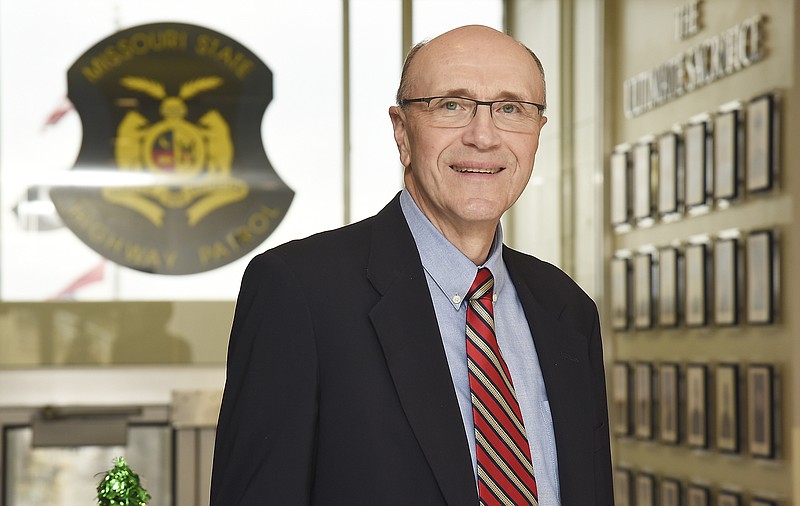The ongoing joke for Larry Rains, the Missouri Highway Patrol director of fleet and facilities division, is that he couldn't hold a job until he went to work for the Missouri Highway Patrol.
But, once the organization hired him, he stuck for 31 years.
Rains just finished his last week on the job.
Before landing a job with the patrol, Rains said he tried several things - all dealing with automobiles.
He worked as an auto technician, taught vocational auto mechanics and served as a dealership service manager.
"I tried to find my niche, I guess," Rains said. "My background is automotive - that's basically where I've spent my entire career."
In 1987, while working at his last job before joining the Highway Patrol, Rains found he was unhappy. Then, he learned of an opening for an auto technician with the patrol.
"I actually took a step back. And I really had no vision of what I'm doing today," he said. "I was very happy doing that. It was a good job. I've just been blessed."
A retirement within the office created an opening for a fleet analyst. The job, which no longer exists moved him from the garage into the office.
That led to a job as an assistant division director. Then, in 1996, the director of the division - who was a sworn officer - died of cancer.
The Highway Patrol decided to make the position a civilian and hired Rains to fill it.
Rains, who has been married for 44 years and has an adult son living in Arkansas, finally found the right job.
And the position continued to evolve. About 10 years ago, the Office of Administration decided to consolidate facilities management and moved a position out of the Highway Patrol. That left responsibilities that Rains was required to pick up, including supervision of certain building and ground maintenance and custodial personnel. He ended up with about 30 employees under his wing.
"At this level you don't have to be an auto technician to do what I do. That's where I got my start, but certainly, you can do just as well without being an auto technician," he said. "But, you do need a good general knowledge and a mechanical aptitude to do the job properly, I guess.
"To do the job - job specifications and those types of things - you have to learn about the vehicles. You have to understand the intricacies of vehicles - how they're built - to determine what best fits our needs."
Those needs change. For example, in 2011, the Water Patrol was merged into the Highway Patrol. That meant that Rains' division then had to select and maintain watercraft.
"That was a big change for us," he said. "We didn't have experience with water craft - with vessels. They aren't that far removed from (highway) vehicles. But, there is a learning curve there, and we're still learning."
The department has a number of different water craft it uses, from inflatable boats for rescue operations to 30-foot boats to patrol the Lake of the Ozarks, he said.
A challenge is how often boat manufacturers come and go, he said.
"The one (curious) thing that sticks in my mind was the number of years that we drove the Ford Crown Victoria," Rains said. "For a number of years, it was basically the only police car out there. That was from the mid-1990s through 2011. It was the police car.
"When Ford decided to quit producing that vehicle after the 2011 year, it really drastically changed the face of the police market."
Suddenly, he had to become familiar with Dodge, which got back into the police car business. He had to become familiar with the Chevrolet Tahoe. And then, Ford began offering Excursions as police vehicles.
It created a lot more work for the division - in managing a complex fleet.
And it created better options for officers. The changes have allowed the Highway Patrol to put officers in the best vehicles for them.
We can now better fit the vehicles to the officers' needs. Not all officers have identical duties," he said. "If we have an officer who, for instance, is a commercial vehicle officer who transports portable scales and other equipment they use in truck checks, a Crown Victoria was never a very good vehicle for them. But a Tahoe is because they've got a lot more cargo room."

